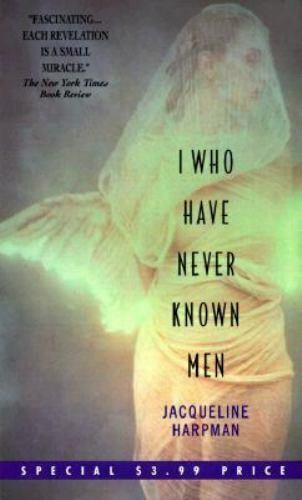I, who read I Who Have Never Known Men, will never be the same again.
Welcome to another fucking awesome, if not the most mind-blowing, book that leaves me staring at the ceiling after finishing it.
If you’ve read this book, let me just stop here and ask: are you okay?

Title: I Who Have Never Known Men
Author: Jacqueline Harpman translated by Ros Schwartz
Published: July 1, 1998 by Avon Eos
Genre: Fiction, Dystopia, Feminism, Literary Fiction, Science Fiction
I Who Have Never Known Men is about a young woman who has grown up in a cage underground with thirty-nine other women, guarded by silent, armed men. She knows nothing of intimacy, books, or time, as they all lived in artificial repetitive days and nights. and then everything suddenly changes, this young woman then confronts the unknowns of freedom and reinvents herself in a world she’s never known.
Hope is a crucial element in this book. Every character is driven by the hope of discovering something that might answer their questions or perhaps find remnants of their past lives. Isn’t it the most human thing to hope for something better despite the odds and the situation?
Some people complain that this book doesn’t seem to go anywhere, and I understand that the plot might appear lacking. But I believe the author intentionally wrote it this way to make her point: that women can endure living with hope and perseverance alone because there could be something better waiting for them on the other side.
I also want to make sure you have the right expectations from this book. It is not plot-driven but rather character-driven. This means that this book focuses primarily on the development of the characters, exploring their thoughts, emotions, and relationships. It does not follow a traditional plot progression with a series of events leading to a climax and resolution.
What I particularly enjoyed in this book is perhaps the irony of the title. It seems that by saying I Who Have Never Known Men, the book become entirely about men. This book explores the experience of becoming a person and a woman from the perspective of never having known men. However, men cannot be entirely removed from the narrative because, while it suggests an absence of men, they seem to play a central role—both as the guards of the confined women and, quite possibly, as the cause of their confinement.
I cannot deny that I read this book with a sense of pessimism. It depicts a dystopian setting where the main character grew up in a cage and never knew the world as we do. This led me to wonder how the author could have detached her perspective from the main character, who has never experienced the world we are familiar with. Despite this, the subsequent chapters seem to maintain the integrity of the main character’s perspective.
Harpman does not show the main character, confined in the cage, seeking freedom. Instead, Harpman understands that if a person has never known what is outside the cage or if such a world might exist, there is little reason to yearn for freedom.
However, when I read the official summary of the book, which discusses the idea of freedom, the portrayal seemed somewhat off. The summary suggests that the main character, once released into the outside world, struggles with her newfound freedom. The choice of the word “freedom” feels problematic because freedom typically implies breaking away from something. In a context where there is no history or culture to bind you, what exactly is there to break away from?
final thoughts…
It took me a long time to gather my thoughts on this book. I like it, but I couldn’t exactly put into words why, what, or what aspects I found so striking, and moving. But here it is, you’re reading the review.
This book is for readers who don’t need a book that answers their questions but instead invites them to ponder, explore, and revel in the questions.
Content Warning: you might feel unwell after reading this book
Leave a Reply